Resource scarcity plays a crucial role in shaping international relations, as nations compete for limited essentials like water, energy, and food. This competition can escalate into conflicts, influence trade dynamics, and reshape diplomatic ties, highlighting the importance of securing resources for national interests. To address these challenges, countries may pursue strategies such as investing in renewable resources and fostering international cooperation, aiming to promote stability and sustainability in a resource-constrained world.
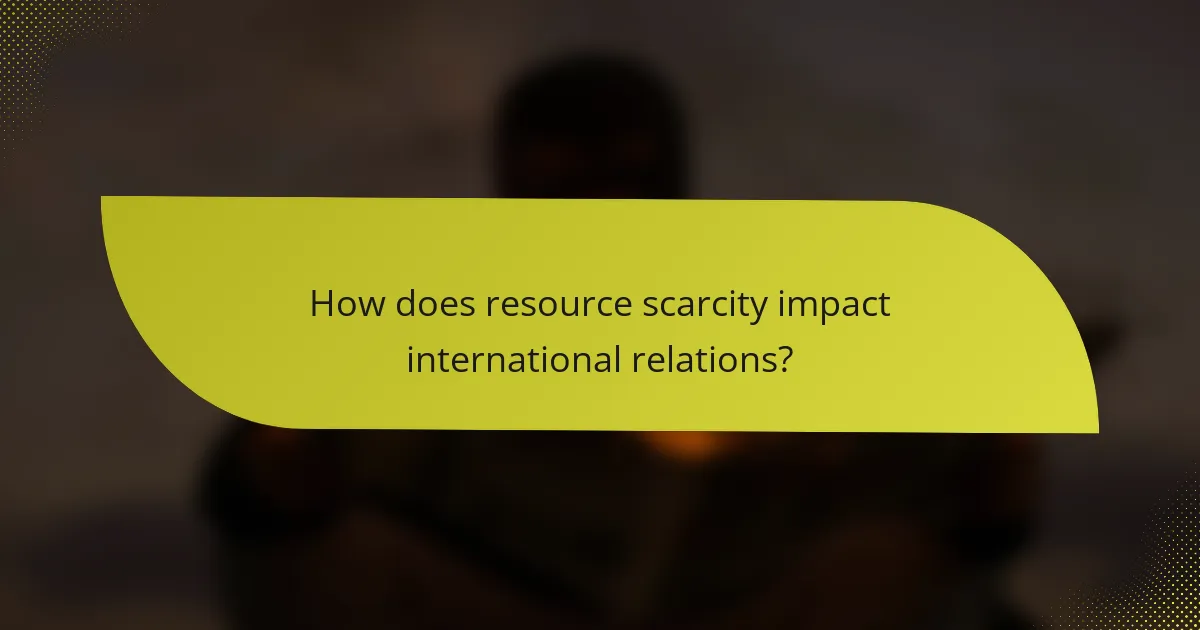
How does resource scarcity impact international relations?
Resource scarcity significantly affects international relations by intensifying competition among nations for limited resources. This competition can lead to conflicts, influence trade dynamics, and alter diplomatic relationships as countries seek to secure their interests.
Increased competition for resources
As essential resources like water, energy, and minerals become scarcer, nations often find themselves in direct competition. This competition can manifest in various forms, from economic sanctions to military confrontations, as countries strive to secure access to these vital commodities.
For instance, countries in arid regions may engage in disputes over water rights, while those rich in fossil fuels may face pressure from energy-dependent nations. Such scenarios highlight the urgency for strategic resource management and international cooperation.
Heightened geopolitical tensions
Resource scarcity can escalate geopolitical tensions, particularly in regions where resources are concentrated. Nations may perceive threats to their security and sovereignty, leading to increased military presence or aggressive posturing.
For example, territorial disputes in the South China Sea are partly driven by competition for oil and gas reserves. These tensions can destabilize entire regions and complicate diplomatic relations, making conflict resolution more challenging.
Influence on trade agreements
Scarcity of resources often reshapes trade agreements as countries seek to secure favorable terms for essential goods. Nations may prioritize agreements that ensure a steady supply of critical resources, leading to shifts in traditional trade partnerships.
For example, countries rich in rare earth elements may leverage their resources to negotiate better trade deals with technology-dependent nations. This can create new economic alliances while potentially sidelining countries lacking these resources.
Shifts in alliances
Resource scarcity can lead to shifts in international alliances as nations realign based on resource availability and needs. Countries may form new coalitions to secure access to resources or to counterbalance the influence of resource-rich nations.
For instance, nations in the Middle East may strengthen ties with each other to collectively manage oil resources, while countries in Europe might seek partnerships with Africa for sustainable resource access. These shifts can redefine global power dynamics and influence international policy decisions.
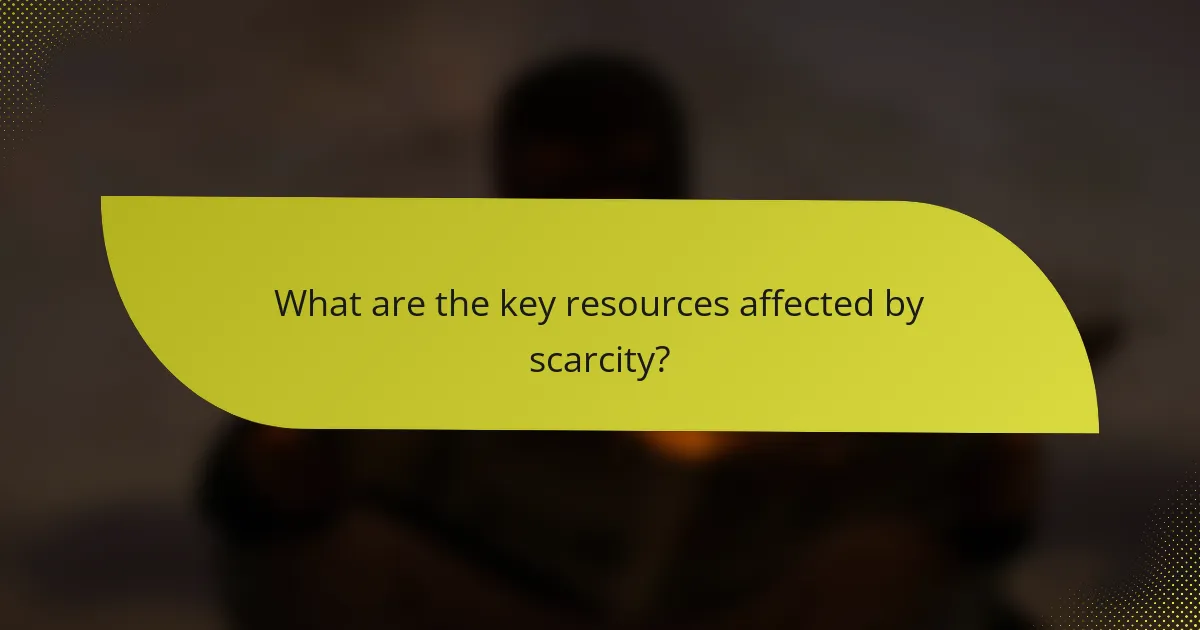
What are the key resources affected by scarcity?
Key resources affected by scarcity include water, energy, and food. These resources are essential for human survival and economic stability, and their scarcity can lead to significant geopolitical tensions and conflicts.
Water resources
Water scarcity is a critical issue impacting many regions worldwide, particularly in arid and semi-arid areas. Factors such as climate change, population growth, and pollution exacerbate the depletion of freshwater sources. Countries may face competition over shared water bodies, leading to diplomatic disputes or even conflict.
To manage water scarcity, nations can invest in technologies like desalination and water recycling. Implementing efficient irrigation practices in agriculture can also help conserve water resources. For example, drip irrigation can reduce water usage by up to 50% compared to traditional methods.
Energy resources
Energy resources, particularly fossil fuels, are increasingly scarce due to rising global demand and finite reserves. The transition to renewable energy sources like solar and wind is essential for sustainability, but it requires significant investment and infrastructure changes. Countries rich in fossil fuels may experience geopolitical leverage, while those dependent on imports face vulnerabilities.
To mitigate energy scarcity, governments can promote energy efficiency and diversify energy sources. For instance, implementing energy-saving technologies in industries can reduce consumption by 20-30%. Additionally, investing in local renewable energy projects can enhance energy security and reduce reliance on imports.
Food security
Food security is threatened by resource scarcity, climate change, and economic instability. As arable land becomes less available and water resources dwindle, food production faces significant challenges. Countries may experience increased prices and food shortages, leading to social unrest and migration.
To improve food security, nations can adopt sustainable agricultural practices such as crop rotation and organic farming. Supporting local food systems and reducing food waste are also effective strategies. For example, reducing food waste by just 25% could feed millions of people globally, highlighting the importance of efficiency in food distribution.
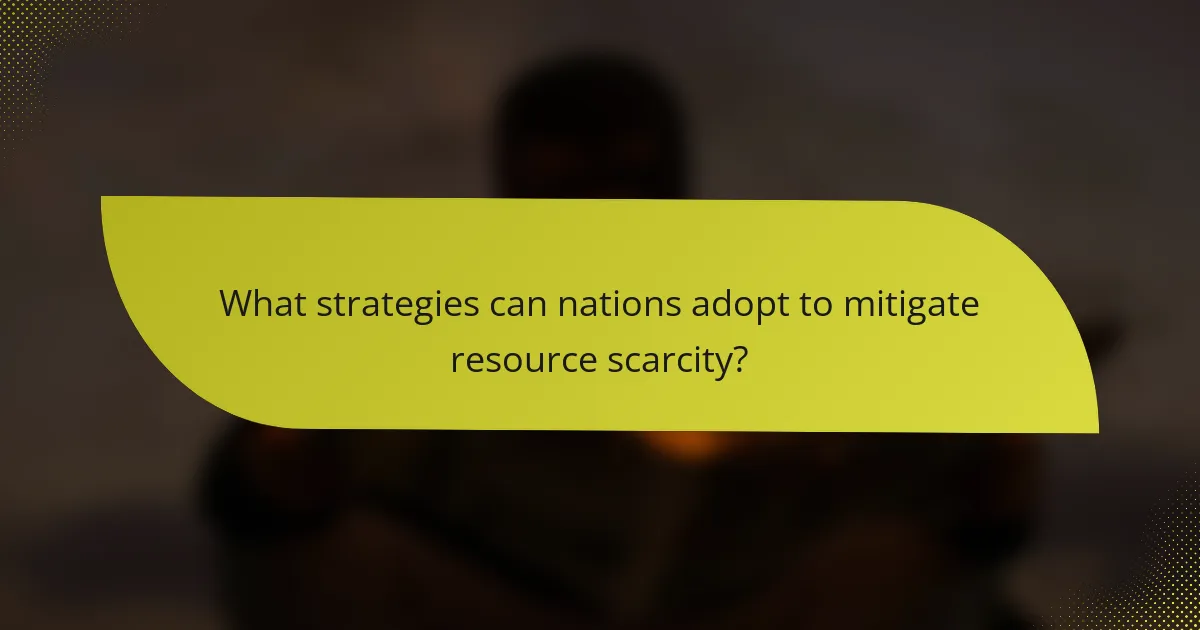
What strategies can nations adopt to mitigate resource scarcity?
Nations can adopt several strategies to mitigate resource scarcity, including investing in renewable resources, fostering international cooperation, and promoting technological innovations. These approaches can help ensure sustainable access to essential resources while minimizing conflicts and enhancing global stability.
Investment in renewable resources
Investing in renewable resources is crucial for reducing dependence on finite supplies. Countries can focus on harnessing solar, wind, and hydroelectric power, which are increasingly cost-effective and environmentally friendly. For instance, nations like Germany and Denmark have made significant strides in wind energy, leading to substantial reductions in fossil fuel consumption.
Governments can incentivize investments through subsidies, tax breaks, or public-private partnerships. By creating a favorable regulatory environment, they can encourage businesses to develop and deploy renewable technologies, ultimately contributing to energy security and sustainability.
International cooperation and treaties
International cooperation is essential for addressing resource scarcity on a global scale. Countries can engage in treaties that promote sustainable resource management and equitable distribution. Agreements like the Paris Agreement highlight the importance of collaborative efforts to combat climate change and its impact on resources.
Joint initiatives can also include sharing technology, knowledge, and best practices. For example, countries can work together on transboundary water management to ensure that shared water resources are used sustainably, preventing conflicts and fostering regional stability.
Technological innovations
Technological innovations play a vital role in mitigating resource scarcity by improving efficiency and reducing waste. Advances in areas such as water purification, energy storage, and agricultural practices can significantly enhance resource utilization. For instance, precision agriculture technologies enable farmers to optimize water and fertilizer use, leading to higher yields with lower resource inputs.
Investing in research and development is crucial for fostering these innovations. Governments and private sectors should collaborate to support emerging technologies that address resource challenges, ensuring that solutions are scalable and accessible to various economies.
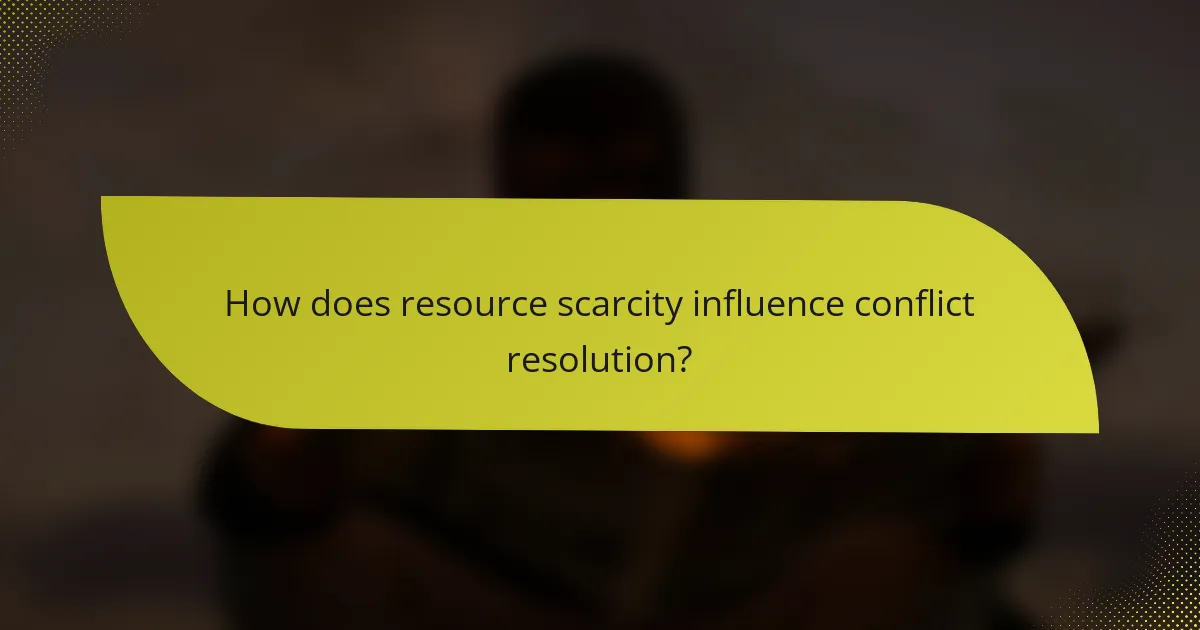
How does resource scarcity influence conflict resolution?
Resource scarcity significantly impacts conflict resolution by heightening tensions between nations or groups competing for limited resources. This competition can lead to disputes that require effective negotiation and mediation strategies to achieve peaceful outcomes.
Negotiation frameworks
Negotiation frameworks are essential for addressing conflicts arising from resource scarcity. These frameworks provide structured approaches that help parties articulate their needs and interests while seeking mutually beneficial solutions. For instance, parties may utilize interest-based negotiation, focusing on underlying needs rather than positions, which can lead to more sustainable agreements.
Key steps in a negotiation framework include identifying the resources in question, understanding each party’s stakes, and exploring options that satisfy the interests of all involved. Effective communication and trust-building are crucial components, as they foster a collaborative atmosphere conducive to resolution.
Third-party mediation
Third-party mediation plays a vital role in resolving conflicts driven by resource scarcity by introducing an impartial facilitator to the negotiation process. Mediators can help clarify issues, manage emotions, and guide discussions toward constructive outcomes. Their expertise often aids in bridging gaps between conflicting parties.
When considering third-party mediation, it is important to select a mediator with relevant experience and cultural understanding. Successful mediation often involves establishing ground rules, ensuring confidentiality, and facilitating open dialogue. This approach can lead to more durable agreements, especially in regions where resource competition is intense, such as water disputes in arid areas or energy conflicts in resource-rich zones.
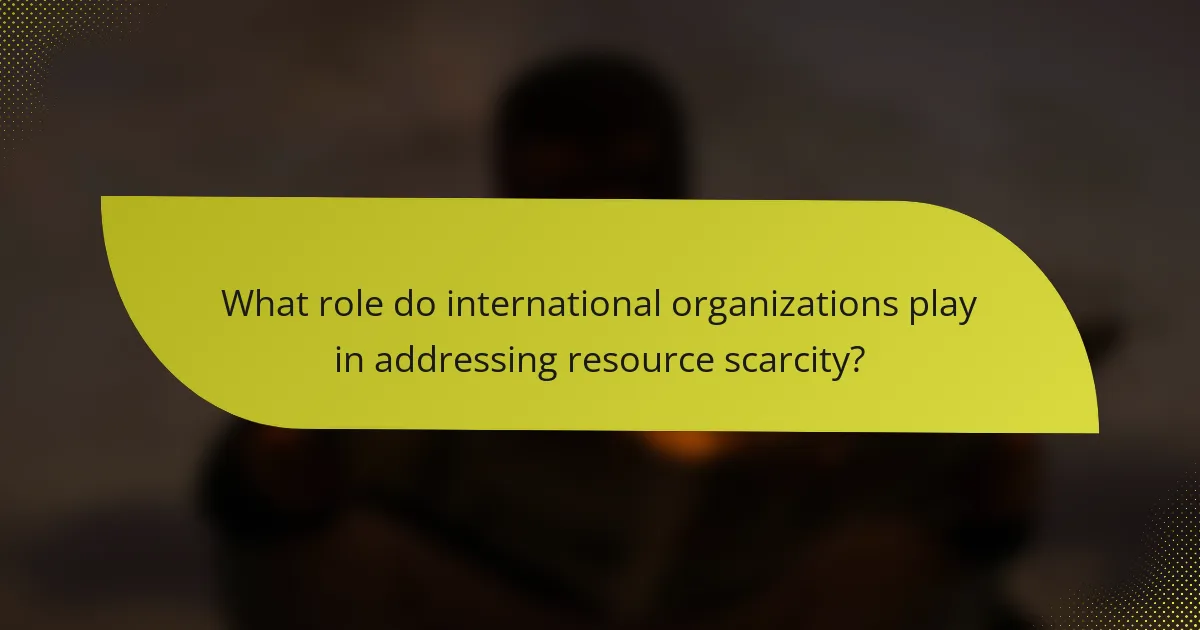
What role do international organizations play in addressing resource scarcity?
International organizations play a crucial role in addressing resource scarcity by facilitating cooperation among countries, promoting sustainable practices, and providing financial and technical support. Their initiatives help nations manage resources more effectively, ensuring equitable access and long-term sustainability.
UN initiatives on sustainable development
The United Nations (UN) promotes sustainable development through various initiatives aimed at addressing resource scarcity. The UN’s Sustainable Development Goals (SDGs) include targets for responsible consumption and production, clean water, and climate action, encouraging countries to adopt policies that balance economic growth with environmental protection.
Programs like the UN Environment Programme (UNEP) focus on enhancing resource efficiency and promoting sustainable practices globally. These initiatives often involve partnerships with governments, NGOs, and the private sector to implement solutions that address local resource challenges.
World Bank funding for resource management
The World Bank provides funding and technical assistance to countries for effective resource management, focusing on projects that enhance water, energy, and land use efficiency. This financial support often comes in the form of loans or grants aimed at developing sustainable infrastructure and practices.
For instance, the World Bank’s investment in renewable energy projects helps countries reduce their dependence on fossil fuels, thereby addressing both resource scarcity and environmental concerns. By prioritizing projects that promote sustainable resource use, the World Bank plays a vital role in fostering resilience against resource-related challenges.
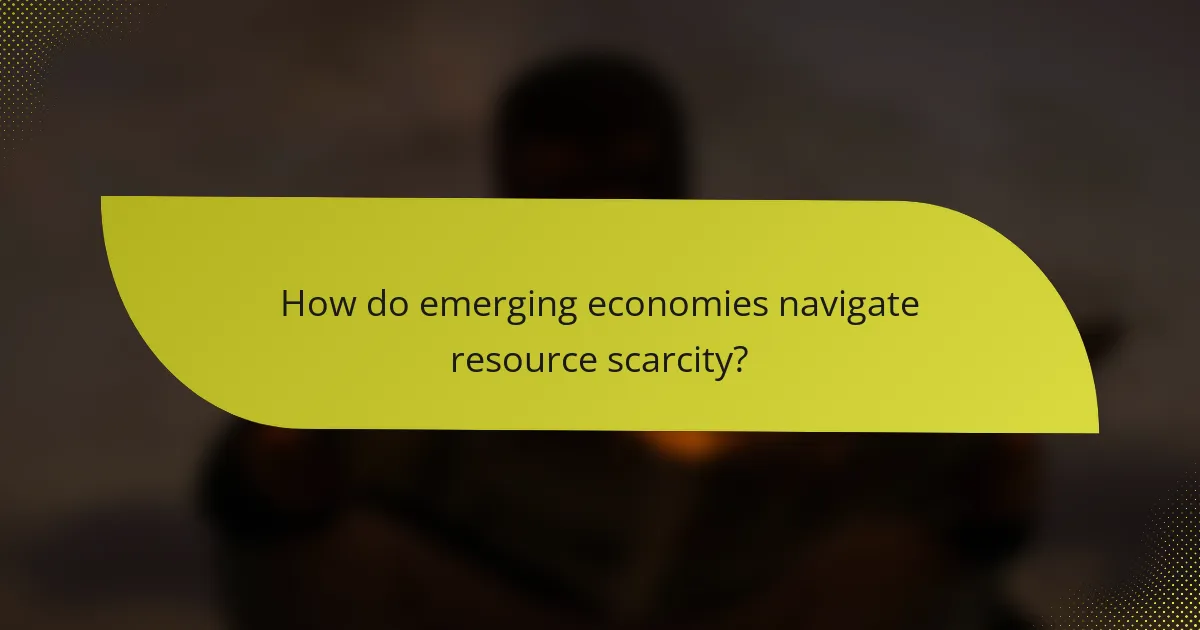
How do emerging economies navigate resource scarcity?
Emerging economies tackle resource scarcity by adopting strategic policies, diversifying supply sources, and investing in sustainable practices. These nations often face significant challenges due to limited access to essential resources, which can impact their development and international relations.
Strategies for Resource Management
Emerging economies employ various strategies to manage scarce resources effectively. These include enhancing resource efficiency, investing in technology for better extraction and usage, and implementing conservation measures. For instance, countries may focus on renewable energy sources to reduce dependence on fossil fuels.
Diversification of Supply Sources
Diversifying supply sources is crucial for emerging economies facing resource scarcity. By establishing trade agreements with multiple countries, they can mitigate risks associated with supply disruptions. For example, a nation might secure imports of critical minerals from different regions to ensure a steady supply for its industries.
Investment in Sustainable Practices
Investing in sustainable practices is essential for long-term resource management. Emerging economies are increasingly adopting green technologies and practices that minimize environmental impact while maximizing resource use. This includes initiatives like sustainable agriculture, which can enhance food security while preserving ecosystems.
International Collaboration
International collaboration plays a vital role in addressing resource scarcity. Emerging economies often engage in partnerships with developed nations and international organizations to share knowledge, technology, and financial resources. Such collaborations can lead to innovative solutions that benefit all parties involved.
